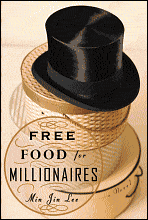Free Food for Millionaires

Free Food for Millionaires is a coming of age novel by prize-winning author Min Jin Lee. It follows the main character, Casey, from her posh college graduation through her uncertainty about what to do with the rest of her life. She struggles throughout the book to reconcile her conservative Korean-American upbringing with feminism and her own desires to break out of proscribed roles.
I found this book very challenging due to both its unconventional narrative style and its flighty, difficult to like protagonist. Although the main character is Casey, the author will often jump inside other character's heads to give you their perspective and stories from their own pasts. Sometimes this works great, as when you jump into Casey's father's head to witness his terrible memories from his childhood in Korea just before he commits an act of domestic violence in the present day. These flashbacks deepen the story and made me more curious about the characters, as well as adding a layer of sadness because the reader can see how often the drama in the story comes from the characters' misunderstanding of each other. But sometimes these "story microbursts" slow down the book when they are from the point of view of very minor characters. The book is already long (560 pages), and seeing things from so many viewpoints takes away from the momentum of Casey's story.
And then there's Casey herself. Here is where I think the author did a very interesting thing in creating a character who is both fascinating to follow and completely infuriating. She will constantly make you analyze both her ideas, especially towards feminism, and your own. Sometimes Casey's feminism seems to consist of, "Let's max out our MasterCards at Bloomie's and then all go get abortions!" or "I like shopping so I'm a feminist rebel!" or "I'm sexually liberated, unlike my silly goose sister who wants to follow her dumb old religion, but my own boyfriend still boinks co-eds two at a time!" Casey is conflicted, and this book certainly throws enough drama her way, but at times I wanted to bang my head against a wall while reading her interior monologues. Still, I was glad that this wasn't just a sugar-coated story, and the characters do have multifaceted discussions about marriage, careers and class issues. It may not be love at first sight with Casey, but you'll want to follow her to the end to see how it all turns out.
A thoughtful review, Dominae. I wondered about your complaint about the multiple POV's. Are you then suggesting that books shouldn't introduce the perspectives of minor characters? Then what's the point of having an omniscient narrators? More importantly (in terms of the concerns of FR), do you feel that a feminist book, in a sense, must have ultimately likable heroines? JWimpossibletransfer.com